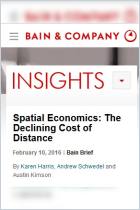
Read or listen offline
Amazon KindleRecommendation
Modern logistics have become a high-tech, sophisticated business sector, showcasing state-of-the-art warehouse robots, advanced conveyor systems, astute inventory management, real-time tracking programs, complex scheduling software and other technological developments. Yossi Sheffi – director of the MIT Center for Transportation and Logistics – examines these vital links in the modern global supply chain, and parses their history, usage and likely future with elegance and understanding. getAbstract recommends Sheffi’s conversational, scholarly overview of modern logistics to executives, students of business, anyone doing business internationally and anyone seeking to get involved in the rapidly growing field of logistics.
Summary
About the Author
Yossi Sheffi is the Elisha Gray II professor of Engineering Systems at the Massachusetts Institute of Technology. He directs the MIT Center for Transportation and Logistics.





















Comment on this summary or Iniciar a Discussão